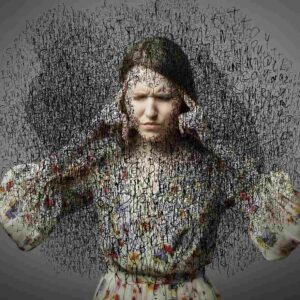Oftentimes, people don’t understand what OCD is. They think it’s just a quirk or habit when in reality, OCD is a mental illness that can be incredibly debilitating. If you have a loved one who suffers from OCD, it’s important to learn about the disorder and how you can help them. In this blog post, we will discuss how to recognize if I have OCD and provide some tips to manage the condition. Keep reading on!
Contents
What Does “I have OCD” Mean?
 OCD is a condition where a person experiences obsessions and compulsions. Obsessions are intrusive thoughts that cause anxiety, while compulsions are repetitive behaviors that a person uses to relieve anxiety. OCD can be a very debilitating condition, but there are treatments available that can help.
OCD is a condition where a person experiences obsessions and compulsions. Obsessions are intrusive thoughts that cause anxiety, while compulsions are repetitive behaviors that a person uses to relieve anxiety. OCD can be a very debilitating condition, but there are treatments available that can help.
When someone says “I have OCD” they’re probably referring to the obsessions part of the condition. Obsessions can take many different forms, but they all have one thing in common: they cause anxiety. People with OCD might obsess about germs and contamination, or they might have intrusive thoughts about harming others.
These thoughts can be so distressing that they interfere with a person’s ability to live their life. People with OCD might avoid situations that trigger their obsessions, or they might engage in compulsions, like excessive hand-washing, to try to relieve their anxiety.
The feeling of having OCD can be difficult and simultaneously all-consuming. It’s important to remember that OCD is a real condition that can be treated. If you know someone with OCD, there are things you can do to help. But the first thing which people need to understand is what it feels when you have OCD. Let’s discuss this further for a clear understanding.
How To Recognize If I have OCD?
It is actually difficult to identify if someone has OCD. This is because many people with OCD are able to hide their compulsions or obsessions very well, in order to avoid judgment or embarrassment. However, there are some key signs and symptoms that may suggest that someone has OCD:
- Excessive hand-washing or showering
- Avoiding touching objects for fear of contamination
- Hoarding or collecting objects
- Excessive cleaning or organizing
- Constantly checking things (e.g., locks, appliances)
- Repeating certain actions or rituals (e.g., tapping, blinking)
- Avoiding certain situations or places (e.g., elevators, public restrooms)
- Intrusive, unwanted thoughts or images
Moreover, these signs and symptoms may vary in frequency and intensity, and they can cause a significant amount of distress or interference in one’s life. If you think you might have OCD, it is important to seek professional help.
Because only a mental health professional can do a proper diagnosis, it is essential to consult with a therapist or psychiatrist who is experienced in treating OCD. They will be able to ask you questions and perform certain tests to determine if you have the disorder. Once a diagnosis is made, they can work with you to develop a treatment plan.
Overall, if you are feeling low or having any of these symptoms, it is essential to consult with a professional. Trust your instincts and get the help you need.
How Does It Feel Like To Have OCD?
 When someone is suffering from OCD, they often feel like they are on a constant roller coaster. Their thoughts and behaviors can feel out of control, and they may feel like they are trapped in a never-ending cycle of obsessions and compulsions.
When someone is suffering from OCD, they often feel like they are on a constant roller coaster. Their thoughts and behaviors can feel out of control, and they may feel like they are trapped in a never-ending cycle of obsessions and compulsions.
It can be tough to understand what goes on inside the mind of someone with OCD. If you’ve never experienced obsessions and compulsions, it might be hard to imagine how distressing they can be. But there are some ways to get an idea of what it’s like.
For one thing, it’s important to remember that people with OCD are not usually aware that their thoughts and behaviors are irrational. They may know that their compulsions don’t make sense, but they can’t help it. It’s not like they’re choosing to think or behave in a certain way; their OCD is dictating their actions.
What’s more, OCD can be incredibly time-consuming and disruptive. It can interfere with work, school, and personal relationships. People with OCD may avoid certain situations or places altogether because they’re afraid of triggering their obsessions. In severe cases, OCD can completely take over a person’s life.
Therefore if any of these situations or behaviors sound familiar to you, it is important to reach out for help. OCD can be a very debilitating disorder, but there are treatments that can help. With proper treatment, many people with OCD are able to live normal, productive lives.
How OCD Is Diagnosed?
Many people with OCD do not seek help because they are embarrassed, ashamed, or afraid of what others will think. If you think you might have OCD, it is important to see a mental health professional for an accurate diagnosis. A professional can rule out other conditions that may be causing your symptoms and help you find the most effective treatment.
To diagnose OCD, a mental health professional will ask you questions about your symptoms and how they affect your life. He or she may also give you a physical exam to rule out other conditions that could be causing your symptoms.
Other methods to diagnose OCD may include:
- Psychological evaluation
- Medical history
- Observation of symptoms
- Lab tests (to rule out other conditions)
So, please reach out to a professional for an accurate diagnosis if you think you may have OCD. It is important to get the help you need in order to live a happy and healthy life!
What Are Some Tips To Manage OCD?
 When you are feeling the obsessions and compulsions start to come on, here are some tips to help you manage them:
When you are feeling the obsessions and compulsions start to come on, here are some tips to help you manage them:
Deep breathing
This can be helpful when you are feeling anxious. Relax your shoulders and take deep breaths in through your nose and out through your mouth. For example, you can count to four as you breathe in and then count to four as you breathe out. Repeat this until you feel your anxiety start to lessen. It can really help to focus on something else while you are doing this, like a mantra or positive affirmation.
Distract yourself
When you feel like you are about to start obsessing or compulsive, try to distract yourself with something else. This can be anything that takes your focus off of the obsession and helps you to relax. For example, you can:
- Read a book
- Watch a movie
- Listen to music
- Talk to someone
- Play a game
It is important to find something that works for you and that you can do at the moment. Experiment with different things until you find what helps you the most.
Visualize a calm place
This can be somewhere you have been before or somewhere you would like to go. Try to focus on the sights, smells, and sounds of this place. This will actually help to relax your body and mind. In fact, when you visualize a calming place it can help to lower your heart rate and blood pressure. Because you will more likely to divert your focus to a peaceful place, it can help to lessen your obsessions and compulsions.
Face your fears
With OCD, people often try to avoid their triggers and the things that cause them anxiety. However, this can actually make OCD worse. When you try to avoid your triggers, it can increase your anxiety and make OCD stronger. Instead, it is important to face your fears and anxieties head-on. This will help you to become more resistant to them over time. So, face your fears in order to help lessen your OCD symptoms.
Focus on a self-care routine
 When you are dealing with a mental illness like OCD, it is important to focus on taking care of yourself. This includes both your physical and mental health. Make sure to:
When you are dealing with a mental illness like OCD, it is important to focus on taking care of yourself. This includes both your physical and mental health. Make sure to:
- Eat a balanced and healthy diet
- Exercise regularly
- Get enough sleep
- Reduce stress as much as possible
These might sound like simple things, but they can make a big difference when you are dealing with OCD. Taking care of yourself will help to increase your resilience and give you the strength you need to face your OCD symptoms head-on.
Talk to someone
Sometimes it can be helpful to talk to someone about what you are going through. This could be a friend, family member, therapist, or anyone else to who you feel comfortable talking. Talking about what you are feeling can help to lessen the anxiety and make the obsessions and compulsions more manageable. Because when you share your thoughts and feelings, they become less powerful and have less control over you.
Seek professional help
This is an essential part of your recovery and you should not feel ashamed to ask for help. A therapist can help you to understand your thoughts and feelings, as well as provide you with coping mechanisms to deal with your obsessions and compulsions. The most common treatment approach can be found here. In fact, they will more likely to understand what you are going through and be able to provide you with the help that you need.
Remember, you are not alone in this. It can be a very isolating disorder, but there are people who understand and can help. Do not hesitate to reach out for help when you need it.
Conclusion
To conclude, when you feel like you might have OCD, it is important to seek professional help in order to get a proper diagnosis. If you are diagnosed with OCD, know that you are not alone and that there is help available. With treatment, you can learn how to manage your OCD and live a fulfilling life.
If you are struggling to find the right professional for your condition, you can contact Therapy Mantra for expert guidance. The OCD professionals here will help you understand your condition better and work with you to create a treatment plan that will help you manage your OCD. So, don’t hesitate to reach out for help when you need it. It could be the best decision you ever make. You can also book an online therapy or download our free OCD treatment app on Android or iOS app.


